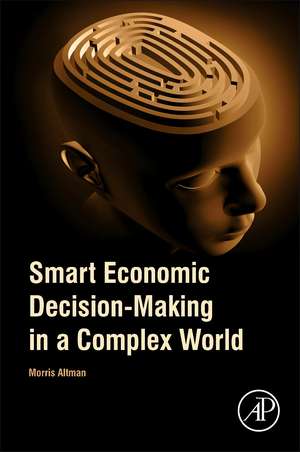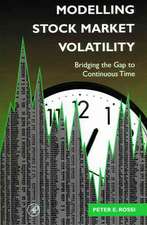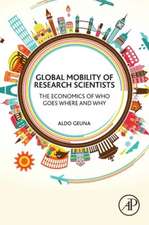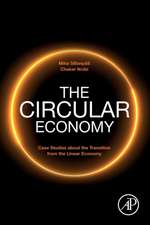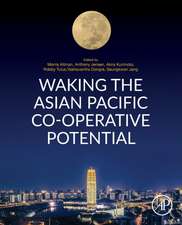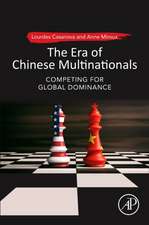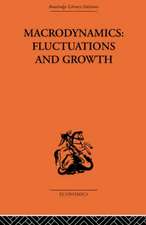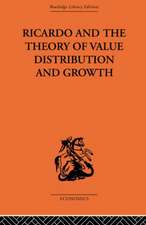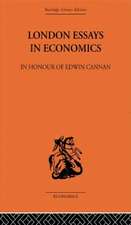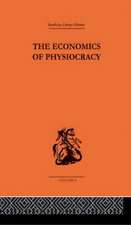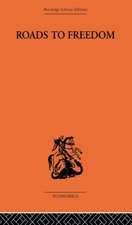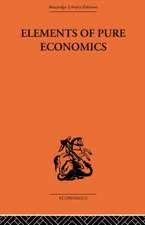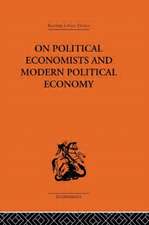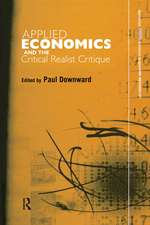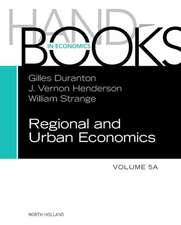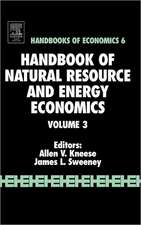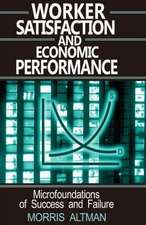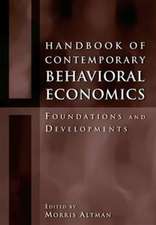Smart Economic Decision-Making in a Complex World
Autor Morris Altmanen Limba Engleză Paperback – 25 mai 2020
Additional sections cover when and how efficiency is achieved, why inefficiencies can persist, when and how consumer welfare is maximized, and what benchmarks should be used to determine efficiency and rationality.
- Makes the case for ‘smart and rational’ decision-making as a context-dependent rational process that is framed by socio-cultural environment and conditioned by institutional capacities
- Explains how incorporation of the ‘smart’ decision-maker concept into economic thought improves our understanding of how, why and when people generate certain outcomes
- Explores how economic efficiency can be achieved, individual preferences realized, and social welfare maximized through the use of ‘smart and rational’ approaches
Preț: 468.55 lei
Preț vechi: 631.48 lei
-26% Nou
Puncte Express: 703
Preț estimativ în valută:
89.69€ • 97.45$ • 75.38£
89.69€ • 97.45$ • 75.38£
Carte tipărită la comandă
Livrare economică 14-28 aprilie
Preluare comenzi: 021 569.72.76
Specificații
ISBN-13: 9780128114612
ISBN-10: 0128114614
Pagini: 302
Dimensiuni: 152 x 229 mm
Greutate: 0.4 kg
Editura: ELSEVIER SCIENCE
ISBN-10: 0128114614
Pagini: 302
Dimensiuni: 152 x 229 mm
Greutate: 0.4 kg
Editura: ELSEVIER SCIENCE
Public țintă
Under(graduate) students in economics and beyond who are interested in decision-making, the process of decision-making, decision making environments, and how real people act in the real world should be interested in this book.Cuprins
1. Introduction: Smart thinking in the real world of complexity2. The evolution of decision-making: Why institutions and capabilities matters3. How complexity affects decision-making4. Freedom of choice in a complex world5. Understanding rational inefficiency: A scientific basis for economic failure and success6. How consumers can achieve freedom of choice: When consumers are truly sovereign7. Inside the black box of the firm: Why choice, power and preferences matter for productivity and efficiency8. How smart people can be involuntarily employment when misguided policy dominates decision-making9. Why financial literacy matters for socio-economic wellbeing10. How labour markets really work
Recenzii
"Considers how individuals’ decisions are impacted by their decision-making environment and decision-making capabilities, examining the determinants of effective decision making from both an individual and social perspective through a smart agent approach. Explores the evolution of behavioral economics from a multidisciplinary rational agent approach. Discusses the evolution of decision making and best-practice decision making from an evolutionary, bottom-up perspective articulated by Friedrich Hayek." --Journal of Economic Literature
"Contemporary behavioral economics often downplays the founding work of Nobel Laureate Herbert Simon and the Carnegie School. Morris Altman shows that Simon’s original behavioral economics can still offer much insight, particularly in highly complex contexts. Going beyond the focus on ‘errors and biases’ in much of current behavioral economics, Altman develops a rich, dynamic analysis, stressing the role of institutional and environmental factors in decision-making. This is an extremely important book." -- Geoff Hodgson, Professor in Management, Loughborough University London
"Morris Altman’s understanding of behavioral economics is broad and far-reaching. In this book he has drawn on the history of economic thought, economics and ethics, and the methodology of economics to explain how behavioral economics has changed the goals and trajectory of recent economics. Especially valuable is his attention to Herbert Simon’s early contribution and those of Gerd Gigerenzer and his colleagues to an ecological economics. Altman’s assessment of Daniel Kahneman and Amos Tversky’s influential work is perceptive and fresh. This book will be very useful to scholars and students looking for a full understanding of this important development in contemporary economic thinking, and is strongly recommended." --John Davis, Professor Emeritus of Economics, Marquette University
"Altman has written an excellent evolution of behavioral economics, and how it is similar and different from neoclassical theory. Anyone interested in behavioral economics will find this book interesting and informative." -- Roger Frantz, Professor Emeritus of Economics, San Diego State University
"Contemporary behavioral economics often downplays the founding work of Nobel Laureate Herbert Simon and the Carnegie School. Morris Altman shows that Simon’s original behavioral economics can still offer much insight, particularly in highly complex contexts. Going beyond the focus on ‘errors and biases’ in much of current behavioral economics, Altman develops a rich, dynamic analysis, stressing the role of institutional and environmental factors in decision-making. This is an extremely important book." -- Geoff Hodgson, Professor in Management, Loughborough University London
"Morris Altman’s understanding of behavioral economics is broad and far-reaching. In this book he has drawn on the history of economic thought, economics and ethics, and the methodology of economics to explain how behavioral economics has changed the goals and trajectory of recent economics. Especially valuable is his attention to Herbert Simon’s early contribution and those of Gerd Gigerenzer and his colleagues to an ecological economics. Altman’s assessment of Daniel Kahneman and Amos Tversky’s influential work is perceptive and fresh. This book will be very useful to scholars and students looking for a full understanding of this important development in contemporary economic thinking, and is strongly recommended." --John Davis, Professor Emeritus of Economics, Marquette University
"Altman has written an excellent evolution of behavioral economics, and how it is similar and different from neoclassical theory. Anyone interested in behavioral economics will find this book interesting and informative." -- Roger Frantz, Professor Emeritus of Economics, San Diego State University
